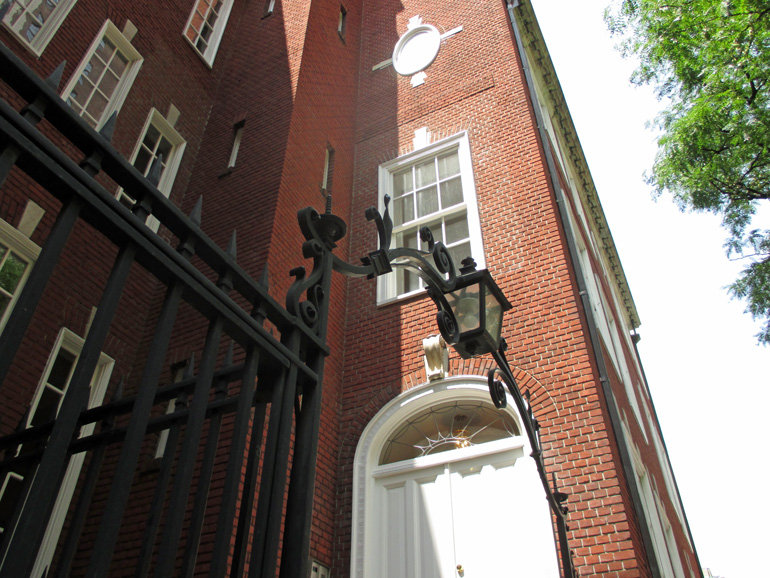
More than halfway through this year’s stay on Fire Island, I’ve finally crossed the capricious line that separates real life from vacation. “Vacation,” of course, means “emptying out”; it referred originally to what happened at universities between terms. What needs to be emptied out during the vacations of today is that buffer of projects and responsibilities known as the to-do list. You’re not on vacation until you’ve lost the sense of having one.
Being me, I had a to-do list just for the vacation. It was really only a to-read list. I lugged a few heavyish books that needed, eventually, to be read. The heaviest was David Cannadine’s Decline and Fall of the English Aristocracy, published in 1990. I bought it when it came out, but I couldn’t read it, because it was just too depressing. Cannadine cleverly labels the world of aristocratic hegemony that preceded the decline and fall “Barset,” after Trollope’s imaginary shire. Barset was something of a dream even when Trollope created it, neater, better-ordered, and more virtuous than any actual county, and largely scrubbed clean of the grubbiness of the Industrial Revolution. I was not sufficiently grown-up in 1990 (aged 42) to watch with equanimity the crumpling of this dream by the pressures of political and economic change. I knew that it did crumple, certainly, and believed that, on balance, the crumpling was a good thing going forward; but, as John Fowles put it in The French Lieutenant’s Woman, there was probably never a more agreeable time to be a gentleman than the year 1850.
Now I can bear it. Having re-read George Dangerfield’s The Strange Death of Liberal England and Roy Jenkins’s biography of Winston Churchill, I’m familiar with many of the names that crop up in Cannadine’s text. Nobody is quite as admirable or benign as the nicer squires in Trollope. The grandees thrash about like doomed dinosaurs, slow to grasp the growing advantages of liquid over landed assets. Their supercilious eogtism makes it difficult to feel very sorry for them, and the gracious way of life that depended entirely on the labor of underpaid servants now seems somewhat inhuman. The political and economic changes that transformed English society in the century after 1870, however grey and plodding, no longer strike me as sordid or regrettable.
I also brought out the first two movements of Anthony Powell’s A Dance to the Music of Time. I was tempted to bring only one; although not as heavy as Decline and Fall, the Powells are substantial, and I wondered if I would actually get to the second movement, or set of three novels. I can report today that it is extremely unlikely that I shan’t. I’m barreling through The Acceptance World, the third novel in the first movement.
I have read the entire Dance once before, but this is a third reading of the first two movements, all of which had come out in paper in the middle of the Sixites. They weren’t what I wanted them to be. Although I couldn’t have put it so simply at the time, I wanted more Stringham and less Widmerpool. Much less Widmerpool. I still felt this way when the University of Chicago edition appeared in the Nineties. But now, just as I have matured sufficiently to listen to what David Cannadine has to say without dabbing my eye with a handkerchief, I understand that Kenneth Widmerpool is the whole point of A Dance to the Music of Time: he is the nightmarish doppelgänger of Powell’s stand-in, Nick Jenkins. As for Charles Stringham, he is no longer a disappointment on the score of not showing up in the narrative with greater frequency. He is, rather, what Powell understood him to be, merely a disappointment.
***
But before I survey Powell’s charms, I’d like to unscramble an anecdote that caused me a great deal of discomfort earlier this summer. We were having dinner with an old friend of Kathleen’s, a man whose charitable intentions are somewhat undercut by a formidably egotistical constitution. Voluble enough as a conversationalist, he does not put enough effort into pruning from his remarks implications that might embarrass or irritate his companions. Sometimes, he does not listen very carefully. When I said that I was thinking of re-reading A Dance to the Music of Time later in the summer, out at Fire Island — assuming, perhaps unreasonably, that, as Kathleen’s good friend, he would know that this trip to Fire Island would be in the nature of a family reunion — he fairly barked, “Oh! I could never go back there, to all that irresponsibility. That was thirty years ago!”
It’s perfectly clear to me what the man meant by this — now. But I was befuddled at the time, because it betrayed a misunderstanding so gross that I couldn’t acknowledge it. I could not imagine that he was talking about Fire Island, because how could he think that Kathleen or I would go back with our grandson in tow? So I tried to fit what he said to Powell’s book, which while it made even less sense was free of insulting repercussions.
For Kathleen’s friend, “Fire Island” is little more than “Fire Island Pines,” one of the two predominantly gay communities to the east of Ocean Beach. Ocean Beach does not exist for Kathleen’s friend. It does not exist for most New Yorkers. There is nothing chic about it, and most of the homeowners seem to hail from the mainland of Long Island. Although a youthful bar scene sprouts up on weekend nights, Ocean Beach is, emphatically, a family resort. Someday, I have no doubt, a gay family or two will take up residence (if this has not already happened), because Ocean Beach is a much more appropriate place for children than the Pines or Cherry Grove. After a burp or two, life will go on.
It is true that Megan spent a week in the Pines when she was eight going on nine. It was the time of the royal wedding, Charles and Diana. Kathleen and I had a half share in a house put together by Fossil Darling; our participation made the rental possible — technically. (We were so impecunious that Fossil floated us.) We came out every other weekend. Kathleen had known a very different Fire Island as a girl; her parents had rented and then owned a house in Dunewood, three or four communities to the west of Ocean Beach, and one of the last to be developed before the National Seashore designation, which saved Fire Island from Robert Moses’s plans for a highway to the Hamptons, put a moratorium on building. But she was game to give the Pines a try. Needless to say, once was enough. The novelty of Pine Clones — brawny fellows in flannel shirts, cutoffs, and what we used to call combat boots walking tiny dogs — wore off pretty fast. One day, we took a water taxi to Saltaire, near the western end of the island, and walked all the way back as far as Ocean Beach, which was, in 1981, no two words about it, a dump.
A few years later, one of our Pines housemates died of AIDS, and the summer of 1981 took on the aspect of a bad dream. It took thirty years for us to think about coming back to Fire Island, and it was Megan who led us back to Ocean Beach. Through an old college roommate who was also in New York, she found herself spending occasional weekends out here in the late Nineties. When, about ten years later, we were all thinking of where to take Will to the beach, it was an Ocean Beach realtor whom Megan had met that Kathleen contacted.
Kathleen’s old friend had also sojourned in the Pines. Later, he decided that the Pines life style was incompatible with his religion.
You will recall, however, that Anthony Powell’s book, not the habitable sand bar by the sea, was the subject of my sentence. I was thinking of reading A Dance to the Music of Time while out at Ocean Beach, although I didn’t say “Ocean Beach” because that wouldn’t have meant anything to Kathleen’s friend. Unfortunately, “Fire Island” meant so much (in its truncated sense) that it swamped what I’d meant to say.
The muddle was compounded by Kathleen’s misunderstanding me to be talking of Dancer from the Dance, Andrew Holleran’s lapidary novel about A-list gay New Yorkers in the late Seventies. Dancer climaxes with a bonfire of alligator shirts on the beach at the Pines. One character walks into the sea, too jaded to go on living, while another perishes, back in Manhattan, in a bathhouse fire. It turned out that Kathleen knew nothing of Anthony Powell’s cycle. So, when I gave up trying to fit her friend’s comment to A Dance to the Music of Time, I found that it made somewhat more sense with reference to Holleran’s book.
It took about three weeks to snap out of all this confusion and to understand that Kathleen’s friend was under the impression, reprovingly enough, that we would be having a family vacation at the Pines, that we would be going back to all that irresponsibility, as he put it, something that he would never do. No longer mystified, I was furious. It’s a good thing that I didn’t understand him when we were having drinks before dinner at his house. Maybe it’s a good thing that, if I’m a thin-skinned old coot, I’m also a thick-headed one.











